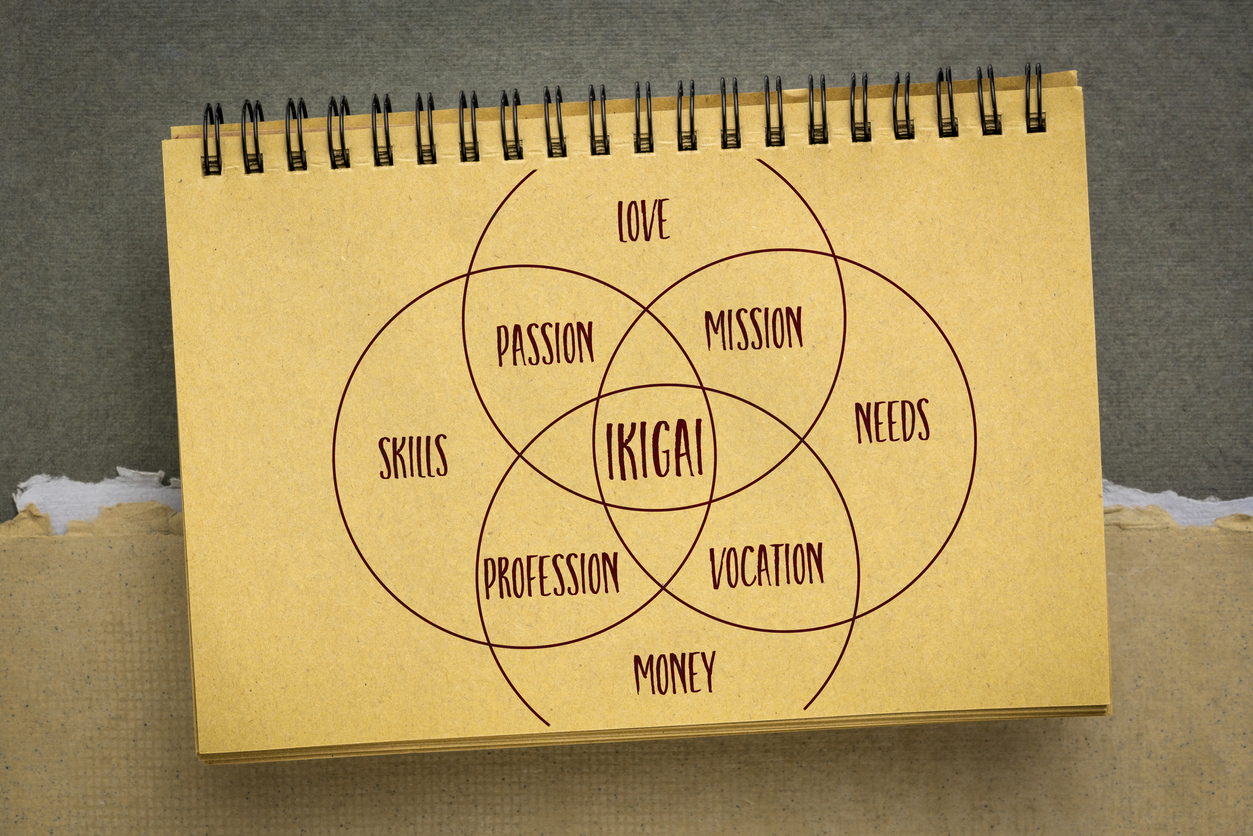What’s your personal and professional sweet spot at the intersection of utility, skill, compensation, and meaning?
As entrepreneurs, our “Why” for doing things is vital and powerful. We’ve explained the “Three Ps of a Purposeful Life” and why having a passion for something without the ability to make money from it is merely a hobby. The organizational version of this is Jim Collin’s Venn diagram: “the intersection of what companies care deeply about, what they can excel at, and what they can make money doing.”
There is another philosophy that expands this to a fourth factor—and proves that not only are these concepts not new, but they cross cultural and temporal boundaries. It’s called Ikigai, a Japanese word that roughly translates to “reason for living” or “reason for being.”
Finding the Ikigai can supercharge a career, give us a reason to get out of bed in the morning, and might even help us live longer.
An ancient concept for modern life
The term Ikigai is somewhere around a thousand years old, and it’s “composed of two [Japanese] words: iki, which means life and gai, which describes value or worth.” In Japan, it can represent the value that one finds through their work or simply the small, everyday things in life. The key to understanding the concept is that it involves deriving contentment and well-being from activity and meaning.
For professional examples, think of a Japanese swordsmith who trains for 10 years and then spends a lifetime honing their craft. Jiro Ono, the famous chef who has spent 70 years perfecting sushi, is another excellent example. Some analysts even believe that Ikigai and its sense of purpose may have a role in the long average lifespans seen in Japan.
Researchers from Mt. Sinai St. Luke’s-Roosevelt Hospital, New York, conducted a meta-analysis of studies that examined the link between “purpose in life and the risk of death or cardiovascular disease.” After reviewing the results from 10 studies involving 136,000 participants—many of whom were Japanese and adhered to Ikigai—the authors found “a lower risk of death for participants with a high sense of purpose in life.” Mortality “lowered by about one-fifth.”
The health benefits are a great reason to pay attention. But the benefits of finding meaning and purpose don’t end there.
The four pillars of Ikigai
Some distinctions define types of Ikigai, such as “personal” or “professional.” Thus, someone’s meaning doesn’t necessarily derive from work. But this idea has been adopted in the West and popularly applied to business philosophy.
The concept expands the three Ps of a purposeful life to four. To find our Ikigai in business, we should ask ourselves:
- What am I good at doing? (Skill)
- What do I love doing? (Passion)
- What will others pay me to do? (Profit)
- What will benefit the world? (Meaning)
By finding the sweet spot where these factors overlap, we not only tap into the motivation, confidence, and skill that breed success, we are happier doing it.
Some people find their Ikigai within the practice of “conscious capitalism” or a career that serves an explicitly noble goal. But others discover it just fine while providing a beneficial service, perfecting a valuable craft, or enabling the people they work with to live a better life.
In truth, the exact “what” doesn’t matter—as long as the effort has real meaning for the individual, it’s useful, and it’s sustainable. In entrepreneurial circles, we put a bit more emphasis on the pay aspect, but that’s just because of another “p” (practicality).
Finding my Ikigai among my Why
For much of my business career, I didn’t recognize my Ikigai and certainly didn’t know there was a word for what I was missing. But fortunately, uncovering my purpose and evolving as an entrepreneur have led me down this path. I now live my Ikigai.
My “Why” is to empower others to live the life they want. Both companies I own align with this motivation, and coaching other entrepreneurs certainly checks those passion and purpose boxes.
I’ve been told that I’m good at what I do, and people keep hiring me. So, I’ve finally conquered my “imposter syndrome” and accepted the idea that I possess the skill to do what I love. Thankfully, I’m also getting paid. In fact, I’m making the most money in my career, and my compensation has expanded by a factor of 10 in about a decade. I believe that fulfilling my Ikigai plays a starring role in these results.
Finally, I am confident that what I am doing will benefit the world. The mission of my firm, The Profit Recipe, is to “empower leaders so that we can change the world, one company at a time.” These aren’t just pretty words or concepts to me. When we help a struggling business owner conquer their challenges and achieve life by design, we see the individual achieve results—and we are energized by it.
The businesses we help are also the building blocks of our community. Strengthening each one is a small but consequential step in bettering our world. Now, that is a reason to get out of bed in the morning.
What’s your Ikigai?
Purpose. Why. Raison d’etre. Ikigai. All of these concepts stress finding meaning in one’s life, and work is a primary outlet for many of us. The personal benefits of defining them can include greater motivation and energy and better mental and physical health. Professionally, they can advance a career or propel a business forward.
Ikigai explicitly ties purpose to doing something that benefits the world. Again, this doesn’t have to involve running a charity, curing a terrible disease, or chasing another noble goal—though it certainly could. Entrepreneurs who provide helpful goods or services offer value to their societies, families, and communities. And when a good business idea fuses with skill, practicality, purpose, and passion, it becomes something far more valuable than just the money it makes.
I truly believe that entrepreneurship can change the world if we use our energy and time for the things we are great at and love. And figuring out our Ikigai is a core component of evolving as an entrepreneur to live Life by Design.
Empower your Leadership Team and improve efficiency, increase value, and foster collaboration to get better results. A professional Facilitator can ensure that all of your members are on the same page, so you can kick your business up a notch. Connect with The Profit Recipe to Achieve Traction.



